Literacy
Stanwell Fields Curriculum Intent
Throughout the school, our work is based on principles which are shared by all staff. It is our belief that we should:
-
develop and value the whole child and enable them to flourish as individuals.
-
give children the opportunity to learn about the wider world and their place within it.
-
ensure children have the knowledge and skills needed to achieve during the next stage of their education and in the future.
-
give children the opportunity to enjoy learning, flourish and achieve in a peaceful, supportive environment of Christian love and care and build respectful relationships.
To read more about out aims and curriculum intent, please visit our curriculum page.
Literacy: Purpose of Study
English has a pre-eminent place in education and in society. A high-quality education in English will teach pupils to speak and write fluently so that they can communicate their ideas and emotions to others, and through their reading and listening, others can communicate with them. Through reading in particular, pupils have a chance to develop culturally, emotionally, intellectually, socially and spiritually. Literature, especially, plays a key role in such development. Reading also enables pupils both to acquire knowledge and to build on what they already know. All the skills of language are essential to participating fully as a member of society; pupils who do not learn to speak, read and write fluently and confidently are effectively disenfranchised.
Literacy: Aims
The overarching aim for English in the national curriculum is to promote high standards of language and literacy by equipping pupils with a strong command of the spoken and written language, and to develop their love of literature through widespread reading for enjoyment. The national curriculum for English aims to ensure that all pupils:
- read easily, fluently and with good understanding
- develop the habit of reading widely and often, for both pleasure and information
- acquire a wide vocabulary, an understanding of grammar and knowledge of linguistic conventions for reading, writing and spoken language
- appreciate our rich and varied literary heritage
- write clearly, accurately and coherently, adapting their language and style in and for a range of contexts, purposes and audiences
- use discussion in order to learn; they should be able to elaborate and explain clearly their understanding and ideas
- are competent in the arts of speaking and listening, making formal presentations, demonstrating to others and participating in debate
We follow the National Curriculum for English. You can find a copy of the English programmes of study for Key stage one and two below:
Literacy at Stanwell Fields
We make links, where possible, through the texts we choose to bring our knowledge rich projects and literacy and guided reading lessons together. We believe this will help children make links, improve knowledge retention and put learning into context. For example, children in Year 2 look at Greta and the Giants and Malala's Magic Pencil when they study Movers and Shakers; Year 3 read Stone Age Boy and How to Wash a Woolly Mammoth during the Through the ages project and Year 6 read Windrush Child and Freedom during their study of Maafa.
All children in Y1-6 have a daily literacy lesson. Children in Year 1 have daily Read, Write, Inc. lessons and children in Year 2-6 have a reading lesson 4 times each week focusing on specific reading and comprehension skills such as retrieval of information, inference or understanding words in context.
During a unit of learning in literacy, children will write for different purposes, for example, to entertain, inform, discuss or persuade. They will also focus on specific grammar or punctuation skills and learn to apply these in context.
A Love to Read end of day class story or novel will also be shared regularly. Again, we try to make links with current projects. Children also have the opportunity to read independently for pleasure.
For more information on phonics and early reading, please visit our dedicated page here.
You can find out more about the learning each half term in our half termly class newsletters and our curriculum overviews.
English Overviews
Year 1
Year2
Year 3
Year 4
Year 5
Year 6
Guided Reading Text Overview Y1-6
Key Performance Indicators


